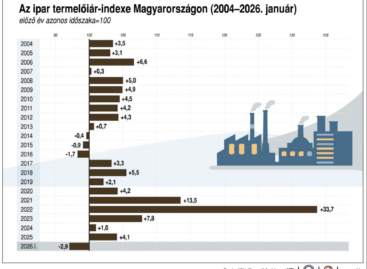The forint strengthened to a winter record high last Wednesday
The forint strengthened to a winter record high last Wednesday – the euro exchange rate even dipped below 407 forints on the interbank money market. The retail interest payment of 17.85 and 18.35 percent for the PMÁP 2033/I and PMÁP 2027/J series, totaling 250 billion forints, has also been made. The long-awaited positive news also holds challenges for the government securities market, noted István Karagich, CEO of Blochamps Capital.
According to the head of Hungary’s leading private banking research and advisory firm, it will be decided in the coming weeks whether the retail government securities penetration built up in 2021-24 will be maintained permanently, or whether we are really just riding the rising yields in government securities portfolios due to the recent high inflation. Karagich reminded us that the last example of the MÁP Plusz program in 2019, during the zero-interest-rate environment, was when an investment with a guaranteed return of nearly 5 percent allowed the share of government securities in many private banking portfolios to rise above 30-40 percent – something similar has happened in recent months.
Blochamps Capital was the one that warned at the beginning of last year that a third of households’ financial assets were concentrated in the hands of just 1 percent of the population. This was confirmed by the data released by the Minister of National Economy, Márton Nagy, over the weekend, according to which only 1.35 percent of the 822,000 account holders have government securities assets worth HUF 100 million, but these 11,130 account holders control nearly 24 percent of the retail government securities portfolio. “In the early 2010s, domestic financial policy was afraid of Mark Möbius, the investment expert at Franklin Templeton, since Templeton owned 25 percent of Hungarian debt held by foreigners. Now, it depends on the decisions of a few thousand ultra-wealthy Hungarians how the domestic financing environment will develop,” the expert argued. “The question is whether the new series of MÁP Plusz, whose average interest rate is now 6.25 percent instead of the previous 4.95 percent, will be a sexy enough offer for the rendezvous worth hundreds of billions.”
It is difficult to quantify, but the flow of wealth is well guessed
According to István Karagich, the stronger the forint this spring, the greater the chance that owners holding significant government bond packages will convert government bond yields into foreign currency investments, and in addition to maturing bonds, they may also start further redemptions, which they can also convert into foreign currency-based investments. According to Blochamps’ forecast, at a euro exchange rate of around 400 forints, up to 5,000 billion forints in government bond yields, maturities and redemptions could seek new investment. A tenth of this money could return to the long-term government bond market – mainly from small investors – and roughly 100-200 billion would be temporarily parked by investors in short-term government bonds. A relatively small part of the money from government bonds – according to Blochamps’ expectations, 50-200 billion forints could be invested in direct equity investments.
At the same time, in the case of a strong forint, the expert does not rule out that the big winners in this case will be foreign exchange investment funds, foreign exchange bonds and direct foreign exchange investments, to which up to 1,500-2,000 billion forints could migrate, and in this case, the question of how much the owners will take abroad will be will be a serious one. This scenario is the biggest challenge from the perspective of the ÁKK, as experience so far shows that savings placed in foreign currency hardly return to forints, the expert reminds.
Related news
KSH: In January 2026, industrial producer prices were on average 2.9 percent lower than a year earlier and 0.9 percent higher than the previous month
🎧 Hallgasd a cikket: Lejátszás Szünet Folytatás Leállítás Nyelv: Auto…
Read more >The GKI business climate index rose in February
🎧 Hallgasd a cikket: Lejátszás Szünet Folytatás Leállítás Nyelv: Auto…
Read more >GDP growth in OECD member countries slowed to 0.3 percent in the last quarter of last year
🎧 Hallgasd a cikket: Lejátszás Szünet Folytatás Leállítás Nyelv: Auto…
Read more >Related news
Festival buzz at the 60th anniversary EuroShop trade fair
🎧 Hallgasd a cikket: Lejátszás Szünet Folytatás Leállítás Nyelv: Auto…
Read more >No matter how much you save, food and gadgets always take the money
🎧 Hallgasd a cikket: Lejátszás Szünet Folytatás Leállítás Nyelv: Auto…
Read more >








